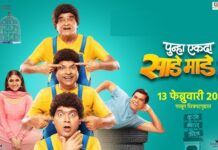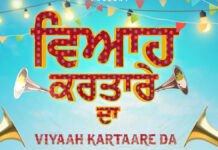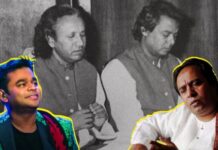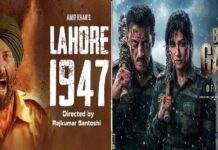Disney Pictures, UTV Software Communications Ltd. and Aamir Khan Productions’ Dangal is a film about wrestling. It is a biopic of Mahavir Singh Phogat, one of the well-known wrestlers of India, and has a story which is supremely motivational and inspiring.
Mahavir Singh Phogat (Aamir Khan) is a wrestler who lives in a small town of Haryana and whose dream had been to win a gold medal for India in the international arena. But his dream remained unfulfilled due to reasons beyond his control. His only hope now is that his son would one day fulfil his dream.
As luck would have it, his wife (Sakshi Tanwar) delivers a baby girl. Mahavir is sad because he had hoped that God would bless them with a son. Anyway, the couple has another child but that is also a baby girl. The third and the fourth kids are, likewise, daughters. Mahavir is now convinced that his dream would remain unfulfilled. Even though he loves his daughters very much, he has even over the years never been able to get over the fact that his unrealised dream of a gold medal would remain just that – unrealised.
One day, he sees that his eldest daughter, Geeta (Zaira Wasim), and second daughter, Babita (Suhani Bhatnagar), have beaten the neighbourhood boys black and blue. This sets his mind ticking – he realises that his girls are in no way less than boys and that his daughters could turn his long-cherished dream into reality. From here, he begins rigorously training Geeta and Babita to become wrestlers. The two school-going girls have to bear the brunt of Mahavir Singh’s strict regimen for them and have also to face the taunts and barbs of people around them and in school for daring to venture in a male-dominated sport, that too, in a small town in Haryana. Geeta and Babita are trained so well that they win tournaments even against male wrestlers.
Soon, Geeta (Fatima Sana Shaikh) and Babita (Sanya Malhotra) grow up to become beautiful girls, now raring to go as wrestlers of national repute. Geeta gains entry into the National Sports Academy and begins to train under a new coach (Girish Kulkarni).
What happens thereafter? Does Geeta reach the finals at the Commonwealth Games? Does she win the gold medal at the CWG and realise the long-cherished dream of her father?
The film, a biopic, is based on a story idea by Divya Rao. The script is penned by Nitesh Tiwari, Piyush Gupta, Shreyas Jain and Nikhil Mehrotra. The story is brilliantly inspiring and has so many twists and turns and highs and lows that it keeps the audience’s eyes glued to the screen. The screenplay is absolutely riveting. It has so much to offer that the viewers’ mind cannot wander for even a moment. In fact, it wouldn’t be wrong to say that it is an almost flawless screenplay from the point of view of the audience.
The first half abounds in light moments even as the strict Mahavir Singh Phogat relentlessly trains his daughters and sees them win at the juniors level. The tension and melodrama begin after interval. While the family drama post-interval tugs at the heart-strings, the tension during the wrestling bouts often leaves the audiences biting their nails and tightening their abdomen muscles. The last about half an hour of the film is so full of drama and tension that the viewers would not want to even blink their eyes if they can help it. The climax has a masterstroke angle to it (when Mahavir Singh Phogat hears a strain of music rent the air) and this will make the audience absolutely euphoric; the weak-hearted may even start crying with joy. Why, people in cinema halls may even stand up during this scene!!
The manner in which the four screenplay writers have woven the track of women empowerment in the drama is veritably remarkable. Two scenes which stand out in this regard are: the one in which Geeta’s friend, at the time of her marriage, tells Geeta and Babita something which gives the two sisters a completely different perspective of things; secondly, the scene in which Mahavir Singh Phogat tells Geeta what she should keep in mind while wrestling in the Commonwealth Games final match. Inherently, of course, there is the strong undercurrent of patriotism. These two angles (of women empowerment and patriotism) will ensure that the drama would appeal to people of all age groups and in all strata of society. Women, especially, will not just love the drama but will actually celebrate this film.
Dialogues are absolute gems. Without being overtly long, they are so effective that they invariably touch the heart before reaching the ears. So much is conveyed in such few words that one can’t marvel at the writers’ genius. The dialogues about women empowerment are sensational and often give the audience goosebumps.
Aamir Khan shines in the role of Mahavir Singh Phogat. He is so outstanding in his performance that this could be considered as one of his best works ever. That Aamir put on tons of weight to look the character speaks volumes for his sincerity. But the physical aspects apart, even his acting is so nuanced and so real that one can’t help but shower endless praises on him. There’s not a single scene in which unnecessary focus is sought to be put on Aamir and this speaks a lot for the director’s genius as well as for Aamir’s sense of fair play. One gets a hint of this all through the film but it comes out loud and clear in the climax. Fatima Sana Shaikh makes an excellent debut as the grown-up Geeta Phogat. She looks very pretty and gives her cent per cent to the role. Her scenes of wrestling are lovely. Sanya Malhotra is superb in the role of the grown-up Babita Phogat. She is also very impressive in her debut role and has a supremely expressive face. Her wrestling scenes are also wonderful. As the young Geeta, Zaira Wasim is first-rate, debuting with unbelievable confidence. As the young Babita, Suhani Bhatnagar is cute and extraordinary in her acting. Both, Zaira Wasim and Suhani Bhatnagar, also shine in their wrestling scenes. Sakshi Tanwar is just too brilliant as Mahavir’s wife. Her expressions are to die for and her reactions are outstanding. Girish Kulkarni plays the NSA coach to perfection and makes his character detestable, which is what is required. His expressions are so understated that it is a delight to watch him act. Aparshakti Khurana lends admirable support as the grown-up Omkar, nephew of Mahavir Singh Phogat. His acting is so natural! Ritvik Sahore is also terrific as the young Omkar. Shishir Sharma leaves a mark as the head of department of the NSA. Badrul Islam has his moments as the chicken shop owner. Vivan Bhathena (as Mahavir’s office colleague), Anurag Arora (as Mahavir’s brother), Sumit Khanna (as Mahavir’s boss), master Anmol Charan (as little Omkar), Jagbir Rathee (as the government officer in charge of sports funds), Gurpreet Toti (as the video parlour guy) and the others lend fantastic support. A word here about Mukesh Chhabra’s casting: he has done a tremendous job of the casting.
Nitesh Tiwari’s direction is amazingly terrific. His narrative style is so simple that even the Haryanvi language spoken by the characters in the film does not come in the way of conveying the drama to the audience in just the way it should be conveyed. He has extracted great work from out of all his actors. Also, there is so much maturity in his narrative style that he may well pick up awards for his direction. Pritam’s music is in terrific synch with the mood of the drama. ‘Dangal dangal’ is a very inspiring song and will soon become a rage. ‘Dhaakad’ and ‘Haanikarak’ are also very well-tuned. The ‘Gilehariyaan’ song has terrific charm of a different kind. Amitabh Bhattacharya’s lyrics are great. The song writer may pick up some awards for his lyrics. Bosco-Caesar’s choreography is very real. Pritam’s background music deserves distinction marks. It heightens the impact of the dramatic and wrestling scenes to a different level altogether. The ‘He-e-e-e-e-y’ sound in the background score to underline moments of euphoria is masterly. Setu’s camerawork is just too wonderful. He has captured the wrestling scenes excellently. He has also captured the drama with phenomenal clarity. Wrestling choreography by Kripashankar Patel Bishnoi (who also trained the actors in wrestling) is truly extraordinary. Not once does the audience feel that the wrestling bouts are not real. Sham Kaushal’s action is very good. Production design by Laxmi Keluskar and Sandeep Meher is amazing. Ballu Saluja’s editing is super-sharp and crisp as ever.
On the whole, Dangal is not just a movie; it is an experience to be cherished. It is extremely engaging, brilliantly entertaining and phenomenally patriotic in its feel. It is as much a film for the young as for the old, as much for the classes as for the masses, as much for the city audience as for the viewers in small towns and villages, as much for the rich as for the poor, as much for the multiplex audience as for the single-screen cinema audience, as much for the men as for the women. It has special appeal for the ladies and it has terrific repeat value. To say that it will prove to be a blockbuster is to state the obvious. The film is destined to be one of the biggest blockbusters of Indian cinema. In fact, it can turn out to be THE BIGGEST BLOCKBUSTER EVER!




























